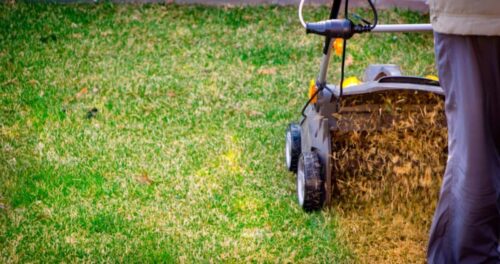So, is power raking good for lawns? Power raking involves removing a large buildup of thatch in your lawn.
While it is different from dethatching your lawn, it is one way to keep a lawn in tip-top shape.
However, the process of power raking is much more intensive than some other lawn care methods.
Disclosure: This article may contain affiliate links – that means we may receive a commission if you make a purchase after clicking on these links. This is at no extra cost to you.
Power raking is good for your lawn only if your lawn needs it.
When there is an excessive buildup of thatch in your grass, power raking can be a useful tool. Other times, power raking might be too agressive for your lawn.
Continue reading to learn more about if power raking is good for your lawn. In certain instances, it can be a great way to make your lawn look fresh and clean, while other times, there may be no point in power raking. It is also useful to distinguish between power ranking and dethatching.
Why You Might Need To Power Rake Your Lawn
The first thing you need to know is that power raking is not recommended if you do not absolutely need it. When done inappropriately, power raking can dig up healthy grass and cause a lot of damage. So, what might cause you to need to power rake your lawn?
Thatch is the buildup of dead grass, leaves, and other materials that can clump together at the base layer of the soil. Thatch can be beneficial for your lawn if it is not too drastic. Anywhere between ½ inch and ¾ inch of thatch can help fertilize your yard and keep the top layer of soil insulated. Excess thatch, however, can suffocate your yard.
In extreme cases, that is, instances where excessive thatch has noticeably caused damage to your yard, you might consider power raking your lawn. The process of power raking involves rotating blades that slice through the thatch, untangling it from being intertwined with your healthy grass.
Technically, power raking does not “dig up” thatch; it simply chops it up. After power raking, you should mow your lawn to gather the cut-up thatch.
If you see that the thatch in your lawn has stunted the growth and visual health of your lawn, power raking can be a good idea. However, if you choose to power rake your lawn, you should consider getting professional work done rather than doing it yourself, especially if you do not have prior experience.
Improper power raking can destroy your lawn. If your blades cut the thatch too aggressively or too deeply, you can tear up the healthy top layer of soil, thus killing all of your grass in the long run. Not everyone recommends power raking because some people will not do it properly. If you decide to have power raking done on your lawn, it is essential to know that whomever you hire to do so is well-equipped with the necessary skills to get the job done correctly.
Power Raking Vs. Dethatching
If you know anything about lawn care other than mowing, the chances are that you have heard of both power raking and dethatching. Though very similar, the processes are not the same. Now that you know what power raking is, how is dethatching any different?
Both power raking and dethatching are a means to remove the thatch from your yard. Whereas power raking uses rotating blades, dethatching involves fixed tines – stake-like tools – to dig up the thatch rather than chop it up.
There is much debate around whether one should dethatch or power rake a lawn.
What We Recommend
Oftentimes, people claim that power raking is much more intensive than dethatching. With rotating blades, improper power raking could cut too deeply into the surface of your lawn, tearing up the soil and healthy grass. Still, a bad dethatching job can do the same. If the tines go too deeply into the ground, you will have the same problem.
In most cases, professionals agree that dethatching is less intense than power raking. This leads some homeowners to believe that it is a better option because it is gentler on your lawn. However, others insist that it is not sufficient. They prefer power raking because of its high intensity.
Regardless, if you are considering having your lawn power raked, make sure you find a trusted company to do so. If you have no experience whatsoever, trying to power rake by yourself will almost always lead to a damaged yard.
Takeaway
Power raking can be a beneficial way to remove excess thatch from your yard. However, failing to do the job properly can lead to a lawn being in even worse condition than before. Have a professional observe and analyze your lawn’s condition before deciding if you need to power rake it.


